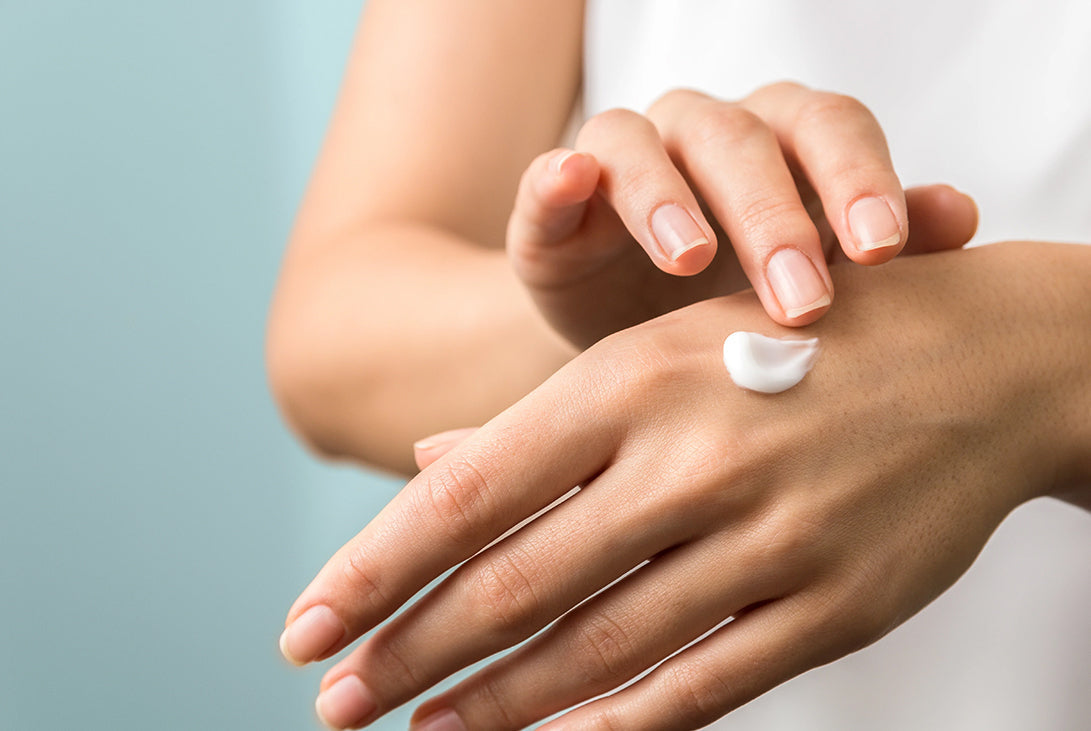
How to Choose Skincare During Treatment
Skincare needs can change significantly during cancer treatment due to the effects of chemotherapy, radiation, or targeted therapies on the skin barrier. Increased sensitivity, dryness, and irritation are common, and even well-tolerated products may begin to cause discomfort. Choosing the right skincare becomes an important part of maintaining skin integrity, reducing discomfort, and supporting overall quality of life. We outline how to select gentle, effective, and oncology-safe skincare during chemotherapy or radiation, including practical tips and product options for compromised skin.
1. Know Your Skin’s New Needs
Cancer treatments can have a significant impact on the health and state of your skin. Your skin barrier normally protects you from irritants and helps retain moisture, but this can become compromised during treatment. This causes skin to become dry, fragile, sensitive, and more reactive to products that were previously well-tolerated. For more detailed information on specifically how your skin can be affected, check out: How Chemo & Radiation Affect Your Skin.
Understanding these changes is the first step to choosing the right products. During this time, the goal is to help protect and heal the skin, minimize discomfort with a soothing skincare routine, and support the skin’s natural healing process.
2. Simplify Your Routine
When your skin is under stress, less is more. During treatment, it's best to follow a minimalist skincare routine focused on comfort and barrier support. Avoid multi-step regimens and active-heavy products, which can overwhelm compromised skin. A supportive skincare routine during chemotherapy or radiation includes:
• Gentle Cleansing: Use a mild, pH-balanced, sulfate-free cleanser that won’t strip the skin of its natural oils. Avoid strong foaming agents like SLS and SLES, as well as any physical or enzymatic exfoliants.
• Moisturize Effectively: Apply a natural, non-irritating, hydrating cream containing barrier-repair ingredients like sweet almond oil, olive oil, squalane, aloe vera, shea butter, panthenol or natural vitmain e.
• Daily Protection: If you're going outside, sun protection is essential. Use a broad-spectrum SPF natural mineral sunscreen (like one containing zinc oxide), which are less likely to cause skin irritation and providing protection.
Using gentle skincare within a simple routine best supports your skin’s natural recovery process by bolstering hydration, reducing the risk of irritation, and helping to maintain maximum skin comfort with minimal stress to the skin.
3. Read Ingredient Labels Carefully
During treatment, your skin may react to ingredients it previously tolerated without issue. For this reason, it's important to examine product labels closely. Prioritize products that are:
• Alcohol-free – Steer clear of drying alcohols such as ethanol and isopropyl alcohol.
• Sulfate-free – Strong detergents found in most clinical washes can be overly harsh and exacerbate dryness.
• Naturally Preserved – Avoid the likes of parabens, phenoxyethanol, and formaldehyde-releasing preservatives.
• Free From Essential Oils – Even plant-based ingredients can sometimes be too harsh and cause reactions.
• Exclude Known Irritants – Penetration enhancers and phthalates are well-known culprits for irritation.
• Skip Steps – Forgo unnecessary skincare steps like exfoliants, toners, or active serums with retinoids, AHAs etc.
Instead, look for natural, gentle, hydrating formulations designed for sensitive or compromised skin. Choosing oncology-approved skincare products with a short, well-considered ingredient list can help reduce the likelihood of irritation.
4. Don’t Forget Your Scalp, Lips, and Hands
While most people focus on the face and body, areas like the scalp, lips, hands, and nails can also be affected.
• Lips - can often become dry, cracked, or sensitive. Choose a lip balm made with natural oils to provide hydration.
• Hands & Nails - can become dry or brittle. Use a soothing moisturizer regularly, especially after hand-washing.
• Scalp - irritation can occur whether or not you lose hair. A gentle treatment cream can provide needed relief.
5. Safe Swaps: Oncology-Friendly Alternatives
Transitioning to safer, more nourishing skincare can make a real difference. Here are some practical swaps using our oncology-safe range, formulated specifically for sensitive, compromised skin. These products avoid harsh ingredients and focus on restoring moisture, calming sensitivity, and protecting the skin barrier.
Try this...instead of a conventional cleanser:
Ultra Gentle Cleanser with Ceramides – A non-foaming, sulfate-free cleanser that supports the skin’s barrier.
Try this...instead of a conventional cream:
Fast Hydrating Lotion – A fast-absorbing, paraffin-free, hydrating formula made with skin-calming ingredients.
Try this...instead of a conventional antiperspirant:
Fresh Cream Deodorant Sensitive – A gentle, aluminum-free deodorant made for delicate underarms.
Try this...instead of a conventional lip balm:
Cow Lick Lip Balm – A nourishing lip balm made with edible oils to protect lips without irritating them.
Try this...instead of a conventional spot treatment:
Skin Calming Cream - A moisturizing, skin irritation relief cream to soothe red, dry, itchy skin.
Try this...instead of a conventional skincare kit:
Oncology Care Set – A curated selection of the best skincare products to use during cancer treatment, including a gentle cleanser, nourishing cream and natural, aluminum-free deodorant.
6. When to Contact Your Care Team
Even with the best at-home care, some skin issues may require medical attention. If you experience any of the following, it's important to reach out to your oncologist or a dermatologist:
• Persistent redness, swelling, or heat in one area
• Skin that peels or blisters
• Painful rashes or open sores
• Signs of infection, such as pus or spreading redness
• Itching or discomfort that doesn't improve with gentle skincare
Don’t hesitate to bring up any skin changes at your regular appointments.
Skincare That Supports
While skincare may seem like a small part of your treatment plan, it has a meaningful impact on your physical and emotional well-being. Choosing the right skincare during treatment is about supporting your body in its healing process.
Our Oncology Care range is designed for individuals undergoing cancer treatment with safe, simple, and soothing formulas. Wherever you are on your journey, we’re here to support you during this difficult time.

